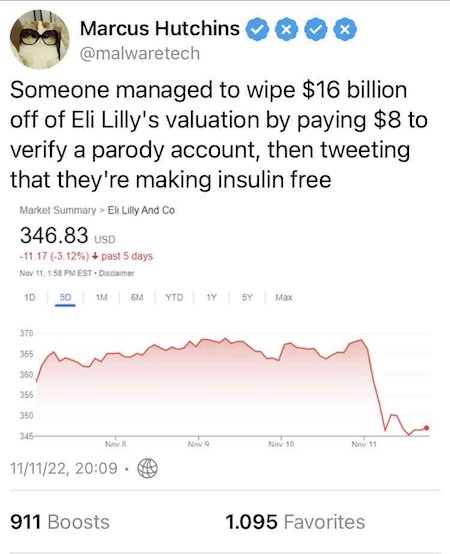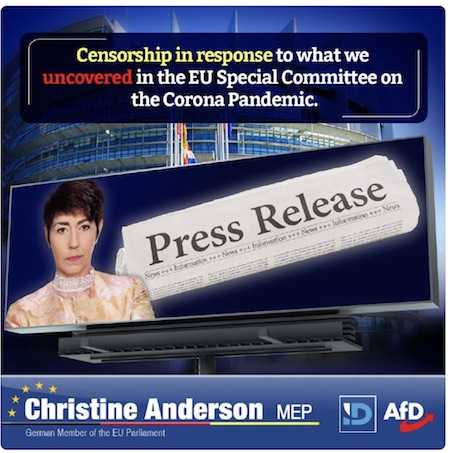
Rembrandt van Rijn The three trees 1643



Elon has work to do…


Welfare queen
"Welfare queen"
AXAXAXAXAXA pic.twitter.com/Y8S7LAX4yQ— Harvester (@thrsts_) November 11, 2022





“When we strive to become better than we are, everything around us becomes better too.”
~Paulo Coelho


“People in Europe are “growing angry over sanctions and blame the US for rising costs,” putting their government under pressure to withdraw their support..”
• US Worried About EU Commitment To Punishing Russia (RT)
EU nations are at risk of deviating from the US-led economic sanctions imposed on Russia for its military campaign in Ukraine, US officials told the media. People in Europe are “growing angry over sanctions and blame the US for rising costs,” putting their government under pressure to withdraw their support, Politico reported on Thursday, citing an internal US report. The document led to a “flurry of calls” among officials in Washington concerned about keeping European leaders on board with the strategy, sources in the US government told the outlet, adding that “things are holding steady for now, but it is a shaky situation.”
Countries in the EU have been struggling with surging inflation, driven to a large degree by rising energy prices. The bloc chose to stop trading with Russia, which used to be its biggest energy supplier, as part of the sanctions drive but is struggling to find a long-term replacement.The crunch has been aggravated by the interruption of gas flow through the Nord Stream 1 pipeline from Russia to Germany and exacerbated further by the bombing of the undersea route in late September. Both Nord Stream 1 and 2, the later was never operational due to Ukraine tensions, were damaged and now require major repairs.
Protests against the rising cost of living have gripped European nations, with mass demonstrations taking place in Greece, Italy, the Czech Republic, and Germany, to name a few. Rallies in Prague two weeks ago and in Rome last week specifically called to end military aid to Ukraine and open dialogue with Russia. French President Emmanuel Macron last month accused Washington of applying “double standards” in its energy policy. The US is propping up its own economy with subsidies and disregards the effect it has on prices across the Atlantic, he noted. American liquified natural gas has taken a large share of the European market since the Ukraine crisis broke out.

“The impact of this crisis on every aspect of European life cannot be overstated.”
• How Europe Is Destroying Its Own ‘Garden’ (MPN)
The European Union’s Foreign Policy Chief Josep Borrell is not particularly perceived by the EU’s political elite or mainstream media as a rightwing ideologue or warmonger. But seen through a different, non-western prism, it is hard not to mistake him for one. Borrell’s recent comments that “Europe is a garden” and that “the rest of the world is a jungle” were duly condemned as ‘racist’ by many politicians around the world, but mostly in the Global South. Borrell’s remarks, however, must also be viewed as an expression of superiority, not only of Borell personally, but of Europe’s ruling classes as a whole. Particularly interesting about the EU top diplomat’s words are these inaccurate depictions of Europe and its relationship with the rest of the world: “We have built a garden”, “everything works” and “the jungle could invade the garden”.
Without delving too deep into what is obviously an entrenched superiority complex, Borrell speaks as if an advocate of the so-called ‘Replacement Theory’, a racist notion advocated by the West’s – Europe especially – rightwing intellectuals, which sees refugees, migrants and non-Europeans as parasites aiming to destroy the continent’s supposedly perfect demographic, religious and social harmony. If stretched further into a historical dimension, one also feels compelled to remind the EU leadership of the central role that European colonialism, economical exploitation, political meddling and outright military intervention have played in turning much of the world into a supposed ‘jungle’. Would Libya, for example, have been reduced to the status of a failed state if the West did not wage a major war starting in March 2011?
The imagined ‘jungle’ aside, Europe’s past and present reality strongly negates Borell’s ethnocentric view. Sadly, Europe is the birthplace of the most horrible pages of history, from colonialism and slavery to the nationalistic, fascist and nihilistic movements that defined most of the last three centuries. Despite the desperate attempt to rewrite or ignore history in favor of a more amiable narrative focused on great splendors, technological advancement and civilizational triumph, Europe’s true nature continues to smolder underneath the ashes, ready to resurface whenever the geopolitical and socioeconomic factors take a wrong turn. The Syrian and Libyan refugee crisis, the Covid pandemic and, more recently, the Russia-Ukraine war are all examples of the proverbial wrong turn. In fact, Borrell’s words, aimed to reassure Europe of its moral superiority are but a foolhardy effort meant to conceal one of the most dramatic crises that Europe has experienced in nearly a century. The impact of this crisis on every aspect of European life cannot be overstated.

“..Jake Sullivan maintained that Washington “is not pressuring Ukraine” into any talks with Russia, insisting that it is “consulting” Kiev as a partner and providing it with various forms of support..”
• White House Divided On Pushing For Peace In Ukraine – NYT (RT)
The US government is divided on whether to pressure Ukraine into initiating peace talks with Russia, with some officials arguing that it won’t get better terms in the future, the New York Times reported on Thursday, citing sources. According to White House officials interviewed by the outlet, Gen. Mark Milley, who heads the US Joint Chiefs of Staff, stated during internal meetings that Kiev’s forces had achieved all that they may reasonably expect before winter sets in and “should try to cement their gains at the bargaining table” with Russia. Milley was apparently referring to Moscow’s recent decision to withdraw its troops from the right bank of the Dnieper River, including the city of Kherson, a move made to preserve the lives of Russian soldiers.
However, other senior officials are said to oppose Milley’s line of thinking, arguing that neither Moscow nor Kiev is ready for talks now, while any lull in the fighting would allow Russia to regroup. Although they believe that the conflict will eventually be settled via diplomacy, the consensus is that the moment for talks “is not ripe,” and the US shouldn’t be seen as trying to hold Kiev back while it “has momentum.” The report comes as US President Joe Biden said on Thursday that he does not “think that the conflict will be resolved until [Russian President Vladimir] Putin gets out of Ukraine.”
The same day, US National Security Advisor Jake Sullivan maintained that Washington “is not pressuring Ukraine” into any talks with Russia, insisting that it is “consulting” Kiev as a partner and providing it with various forms of support. Moscow has repeatedly stated that while it is not holding any talks with the US over Ukraine, it remains open to a diplomatic engagement with Kiev. However, Ukrainian President Vladimir Zelensky has set out conditions for any diplomatic engagement, which include the “restoration of [Ukraine’s] territorial integrity,” “compensation for all war damage” and “punishment of every war criminal.” Zelensky earlier signed a decree prohibiting any negotiations with Putin, suggesting that Kiev would only talk to Russia when it has a different president.

2014 redux.
• Kiev Introduces New Restrictions On Speaking Russian (RT)
The Kiev City Council voted to remove the Russian language from the Ukrainian capital’s public school curriculum on Thursday, citing national security concerns. According to the statement on the council’s website, the ban also covers nursery schools. Vadim Vasilchuk, the chair of the council’s commission on education, said the measure “will prevent an escalation of tensions in society and strengthen the protection of the education space in Kiev from the hybrid activities of the enemy state.” “Language matters, and, in a time of war, it is an issue of national security,” Vasilchuk added. The legislator said all classes would be taught in Ukrainian, the country’s sole state language.
The move came after Alexey Danilov, the head of Ukraine’s National Security and Defense Council, described the Russian language last month as “an element of enemy propaganda” that “must completely disappear from Ukrainian territory.” In August, Ukraine’s Education Ministry said that nearly all works of Russian and Belarusian authors would be removed from literature classes. Ukrainian activists and officials have also been tearing down monuments to Alexander Pushkin, Russia’s national poet and novelist, who lived in the 19th century. A bronze Pushkin bust was removed from its pedestal in the northern city of Zhitomir on Friday, while a monument in Kiev was taken down last month. The rights of the sizable Russian-speaking minority have been a highly contentious issue ever since Ukraine gained independence from the Soviet Union in 1991.
The Donetsk and Lugansk regions broke away from Ukraine in 2014, following the coup in Kiev and in the wake of attempts by Ukrainian officials to restrict the use of Russian in public life. They formed the Donetsk (DPR) and Lugansk People’s Republics (LPR). Ukraine eventually adopted a set of laws that severely limit the use of Russian in public services, media, and education. Moscow repeatedly accused Ukraine of discriminating against Russian speakers. In the days leading up to the Russian military operation in Ukraine that was launched in February, President Vladimir Putin said that the Ukrainian authorities were conducting policies of “derussification and forced assimilation.” The DPR and LPR, together with two other former Ukrainian territories, joined Russia after holding referendums in late September.

“Russian public opinion will have tremendous problems absorbing the news.”
• Sun Tzu Walks Into a Kherson Bar… (Escobar) ft: 20px;”>
Deal or no deal, General Winter is coming to town – ready to entertain his guest of honor Sun Tzu with so many new dishes at their dinner table. The announcement of the Kherson Retreat may have signaled one of the gloomiest days of the Russian Federation since 1991. Leaving the right bank of the Dnieper to set up a defense line on the left bank may spell out total military sense. General Armageddon himself, since his first day on the job, had hinted this might have been inevitable. As it stands in the chessboard, Kherson is in the “wrong” side of the Dnieper. All residents of Kherson Oblast – 115,000 people in total – who wanted to be relocated to safer latitudes have been evacuated from the right bank. General Armageddon knew that was inevitable for several reasons:
no mobilization after the initial SMO plans hit the dust; destruction of strategic bridges across the Dnieper – complete with a three-month methodical Ukrainian pounding of bridges, ferries, pontoons and piers; no second bridgehead to the north of Kherson or to the west (towards Odessa or Nikolaev) to conduct an offensive. And then, the most important reason: massive weaponization coupled with NATO de facto running the war translated into enormous Western superiority in reconnaissance, communications and command and control. In the end, the Kherson Retreat may be a relatively minor tactical loss. Yet politically, it’s an unmitigated disaster, a devastating embarrassment. Kherson is a Russian city. Russians have lost – even if temporarily – the capital of a brand new territory attached to the Federation. Russian public opinion will have tremendous problems absorbing the news.
The list of negatives is considerable. Kiev forces secure their flank and may free up forces to go against Donbass. Weaponizing by the collective West gets a major boost. HIMARS can now potentially strike targets in Crimea. The optics are horrendous. Russia’s image across the Global South is severely tarnished; after all, this move amounts to abandoning Russian territory – while serial Ukrainian war crimes instantly disappear from the major “narrative”. At a minimum, the Russians a long time ago should have reinforced their major strategic advantage bridgehead on the west side of the Dnieper so that it could hold – short of a widely forecasted Kakhovka Dam flood. And yet the Russians also ignored the dam bombing threat for months. That spells out terrible planning.

“All civilians who wished to leave the right bank of Kherson Region were provided with assistance.”
• Russian Defense Ministry Gives Update On Kherson Withdrawal (RT)
Russian forces have completed the redeployment to the left bank of the River Dnieper in Kherson Region, the Defense Ministry has said. The maneuver was completed early Friday morning, according to the statement. The ministry denied reports that military hardware was abandoned on the other bank, or that Russian troops suffered casualties during the withdrawal. “Russian units have taken the prepared defensive lines and positions,” the ministry said. “No loss of personnel, weapons, vehicles, or materiel of the Russian forces was allowed. All civilians who wished to leave the right bank of Kherson Region were provided with assistance.” The statement claimed that Ukrainian troops tried to disrupt the movement of civilians across the river with artillery fire, but failed to do so. Russia intercepted 28 rockets fired by HIMARS launchers and diverted five others through electronic countermeasures, it said.
Russian artillery and aircraft deterred Ukrainian units from closing the gap with the river, the military added. They were stopped at least 30km from the river crossings, according to the statement. Defense Minister Sergey Shoigu ordered the troops to move across the river on Wednesday morning. He said the step was taken to avoid unnecessary deaths of the soldiers and to take up a stronger defensive position. The decision, which was described as “difficult” by military officials, left the provincial capital, Kherson, exposed to capture by Kiev’s forces. The regional authorities have urged residents of the city for weeks to leave and go to safe places to the east. Russia incorporated Kherson Region last month, after the people voted in a referendum to break away from Ukraine and join Russia. Kiev called the vote a “sham” and pledged to keep fighting until all land that it considers to be rightfully Ukrainian is taken.

The west divides, south and east connect.
“..for the Russian Federation, strategic relations with Iran are essential for Russian national security.”
• Rewiring Eurasia: Mr. Patrushev Goes To Tehran (Escobar)
Two guys are hanging out in a cozy room in Tehran with a tantalizing new map of the world in the background. Nothing to see here? On the contrary. These two Eurasian security giants are no less than the – unusually relaxed – Russian Security Council Secretary Nikolai Patrushev and Ali Shamkhani, the Secretary of Iran’s Supreme National Security Council. And why are they so relaxed? Because the future prospects revolving around the main theme of their conversation – the Russia-Iran strategic partnership – could not be more exciting. This was a very serious business affair: an official visit, at the invitation of Shamkhani.
Patrushev was in Tehran on the exact same day that Russian Minister of Defense Sergey Shoigu – following a recommendation from General Sergey Surovikin, the overall commander of the Special Military Operation – ordered a Russian retreat from Kherson. Patrushev knew it for days – so he had no problem to step on a plane to take care of business in Tehran. After all, the Kherson drama is part of the Patrushev negotiations with US National Security Advisor Jake Sullivan on Ukraine, which have been going on for weeks, with Saudi Arabia as eventual go-between. Besides Ukraine, the two discussed “information security, as well as measures to counter interference in the internal affairs of both countries by western special services,” according to a report by Russia’s TASS news agency.
Both countries, as we know, are particular targets of western information warfare and sabotage, with Iran currently the focus of one of these no-holds-barred, foreign-backed, destabilization campaign. Patrushev was officially received by Iranian President Ebrahim Raisi, who went straight to the point: “The cooperation of independent countries is the strongest response to the sanctions and destabilization policies of the US and its allies.” Patrushev, for his part, assured Raisi that for the Russian Federation, strategic relations with Iran are essential for Russian national security.

“Washington’s declaration that Russia no longer qualifies as a market economy..”
• Kremlin Reacts To US Economic Pressure (RT)
Washington’s declaration that Russia no longer qualifies as a market economy not only puts pressure on Moscow but will have repercussions globally, Kremlin spokesperson Dmitry Peskov told reporters on Friday. This latest step “to continue this really destructive line, in no way contributes to the stabilization in global markets,” he emphasized. Peskov was reacting to the US Department of Commerce’s announcement earlier on Friday that the US would no longer treat Russia as a market economy. The department claimed that American industries and manufacturers are struggling to compete with Russian companies in both domestic and global markets.
“This can only be viewed in one way, as it seems to me, it’s the continuation of actions to put pressure on the Russian Federation in all possible directions. We’ve seen pressure on the economy, numerous sanctions and so on,” Peskov said. He added that the Kremlin has been realizing that the Western sanctions have failed to destabilize the Russian economy. Instead, they “cause a fair amount of turbulence,” primarily for the European economy, because the US is more “resilient” in this regard. “Although the Americans also suffer from inflation and the chaos in the energy market,” Peskov added.

“..If insurance was withdrawn mid-voyage, buyers and traders would have to figure out what to do with a stranded cargo potentially exposed to sanctions..”
• Disruptions To Oil Supplies Possible Due To Upcoming EU Restrictions (Az.)
Oil-laden tankers risk being left languishing at sea if insurers do not urgently get clarity on an unfinished G7 and European Union plan to cap the price of Russian crude, two senior industry executives told Reuters, Report informs. The Group of Seven (G7), which includes the United States, Britain, Germany and France, agreed in September to enforce a low price on sales of Russian oil. US officials said the move, which is due to start on December 5, was aimed at allowing it to continue to flow, heading off a potential price shock after total EU bans were ratified in June. And with just three weeks to go, time is running out to fully convince the shipping services industry it will work. Concerns are centered around a scenario in which insurers discover that oil in transit at sea, which was believed to have been sold below the price cap, was in fact sold above it.
This would trigger the withdrawal of insurance cover as well as a refusal by buyers to accept delivery, leading to financial and logistical headaches and risking environmental dangers. “If the time is too short, I think everyone will have a Plan B to de-risk, terminate, stay away, not maybe conclude any new contracts until there is some clarity,” said George Voloshin, Global Anti-Financial Crime Expert at ACAMS, the Association of Certified Anti-Money Laundering Specialists which consults with oil industry bankers, traders and insurers. If insurance was withdrawn mid-voyage, buyers and traders would have to figure out what to do with a stranded cargo potentially exposed to sanctions, complicating a strategy to deprive Russia of funds over its invasion of Ukraine. “It will probably be quite messy,” Voloshin said.
A European Commission official said the EU is aware that much more additional detail will be needed as time runs short for businesses to learn about their obligations, but that the issue must be dealt with at the G7 level. The official spoke to Reuters on condition of anonymity because they are not authorized to speak about the matter. “In that situation, the vessel will go off risk and financial and technical services will be withdrawn and no one is going to take delivery of the cargo,” Mike Salthouse, head of claims at British-based global ship insurer North, told Reuters. “This would be a bad development as no one will want uninsured ships sitting off coasts,” he added. Salthouse said an owner of a ship which was potentially not earning anything for many months “will price that into any decision they make about carrying cargo in the future”, adding that this was likely to act as a disincentive.

“..it was not possible to impose a gas price cap that would not impact on long-term contracts or supply security..”
• Greece Threatens To Block EU Gas Price Correction Mechanism (K.)
Greece is prepared to block a European Commission proposal for a gas price “correction mechanism,” set to be presented to the 27 EU states Friday, instead insisting on a firm cap to rein in an unprecedented energy crisis, Kathimerini has learned. The EU’s executive told its 27 member countries at a seminar Monday that it was not possible to impose a gas price cap that would not impact on long-term contracts or supply security. Germany, the bloc’s largest economy, and the Netherlands also oppose the idea. Reacting to Monday’s development, European Council President Charles Michel reportedly sent a letter to European Commission President Ursula von der Leyen, asking her to put legislation on the table for an EU price cap on natural gas “as soon as possible.”
According to diplomatic sources, the 15 member countries calling for various versions of a price cap will ask the Commission to present a legal proposal during the Friday meeting of the 27 national ambassadors to the EU in Brussels. They say that the Commission has already put together a draft document but is not willing to take formal action. Failure to move in the direction of a price cap will prompt Greece – and other states – to block plans for a gas price “correction mechanism,” the sources said.

An endless list of all links being forged in “the south”. Do read.
• Bamboo Diplomacy: The China-SE Asia Romance (Escobar)
Beijing’s ties with countries now in ASEAN tend to bend the bamboo way: soft, clever, persistent and enduring. The Association of Southeast Asian Nations is monopolizing the Asian and Global South spotlight for no fewer than 10 days, this week and the next, across a flurry of regional and international summits. First stop is Phnom Penh for the 25th China-ASEAN summit, the 25th ASEAN Plus Three (APT) summit, and the 17th East Asia Summit, all the way to Sunday. Next week will be Bali for the Group of Twenty, followed by Bangkok for the APEC (Asia-Pacific Economic Cooperation) summit. No wonder the diplomatic spin across Southeast Asia is all about global governance entering the “Asia moment” – as coined by Chinese Foreign Minister Wang Yi. It’s a moment that may be set to last a century – and beyond.
In parallel, Chinese diplomacy is also predictably on a roll. Premier Li Keqiang – who will step down next March, after two terms in office – heads Beijing’s delegation in Cambodia after two key Southeast Asian interactions: the visit by Vietnamese leader Nguyen Phu Trong to China and Chinese Vice-Premier Han Zheng’s visit to Singapore. All that fits the pattern of increasing China-Southeast Asia integration. Since 2020, ASEAN has been China’s largest trading partner. China has been ASEAN’s top trading partner since 2009. Total China-ASEAN trade reached $878 billion in 2021, up from $686 billion in 2020. It had been $9 billion in 1991. China-ASEAN investment was more than US$340 billion by last July, according to the Ministry of Commerce in Beijing.
Interests particularly converge on deepening RCEP – the Regional Comprehensive Economic Partnership, the largest trade deal on the planet. That translates in practice as closer integration of supply chains, infrastructure connectivity and the building of a new international land-sea trade corridor. So it’s no wonder all the slogans for these 10 days of summits reflect closer integration. The ASEAN 2022 theme is “ASEAN A C T: Addressing Challenges Together.” The Indonesians defined the G20 as “Recover Together, Recover Stronger.” And the Thais defined APEC as “Open. Connect. Balance.”

We’re still counting. Incredible. In more ways than one.
• The Winners and Losers in a Shift in Control of Congress (Turley)
WINNERS – Constitutionalism: The last two years have seen frontal assaults on constitutional values ranging from separation of powers to free speech. Democrats applauded, for example, as President Joe Biden unilaterally waived roughly $500 billion in loans owed to the American people. While courts repeatedly found Biden to have violated the Constitution, Congress remained conspicuously silent even as it joined the president in declaring Republicans threats to the Constitution. In an August New York Times column, “The Constitution Is Broken and Should Not Be Reclaimed,” law professors Ryan D. Doerfler of Harvard and Samuel Moyn of Yale called for our founding charter to be “radically altered” to “reclaim America from constitutionalism.”
It’s safe to say voters effectively reclaimed constitutionalism from such extremist voices. Once again, voters preferred divided government with a Congress willing and able to challenge a president rather than remain a pure pedestrian in the exercise of governance. There’s now a moving part in Congress that’s been dormant for two years. As those institutional gears engage, checks and balances will again force greater accountability and exposure in the constitutional system.
The Supreme Court: For two years, the left has targeted the nation’s highest court with calls for packing it. Polls have long showed this movement was contained almost entirely within the far left. Yet attacking the court and its justices was an article of faith for many Democrats, including Sen. Elizabeth Warren, who called for raw court packing. While the attacks are likely to continue, the shift in Congress will put an end to such radical proposals.
LOSERS- The media: Outlets, in framing the election, consistently echoed Democrats’ narratives — yet failed to deliver them victory. The media now face the prospect of inquiries that could further erode voter trust. Congressional investigations will likely drill down on the Hunter Biden influence-peddling scandal. The media played an active role in burying that scandal and will face questions of how they could turn a blind eye to globe-spanning corruption that involved millions of dollars from foreign political and intelligence figures. They may also see an investigation into backchannels political and government officials used to enlist surrogates in the media and social media for censorship.
The Bidens: The election’s biggest loser could be the Biden family. After successfully avoiding any media or congressional scrutiny of their alleged influence peddling, time is up for the Bidens. Despite Attorney General Merrick Garland’s refusal to appoint a special counsel, they will face investigations launched with the full authority of the Oversight Committee. Garland will also confront demands to show the same aggressive prosecution of contempt of Congress when Biden associates are the subject of such referrals. All this will add to whatever emerges from Delaware in the long-standing investigation of tax and other allegations against Hunter Biden. With the midterms over, the Justice Department will no longer be bound to avoid filings that might influence the election. Hunter could easily find himself under indictment as Congress ramps up a broad investigation into his foreign dealings.

“Biden knew he couldn’t “forgive”your student loan debt…..
He lied for votes knowing it would get thrown out in court!”
• Federal Judge Declares Biden Loan Forgiveness Unconstitutional (Turley)
We have previously discussed how the Administration stretched the 2003 Higher Education Relief Opportunities for Students (HEROES) to the breaking point as the basis for waiving roughly half a trillion dollars in debt owed to the public in college loans. Now, U.S. District Judge Mark Pittman of the Northern District of Texas has issued an opinion declaring that President Joe Biden violated the Constitution in unilaterally forgiving the debt before the midterm election. Judge Pittman wrote “[i]n this country, we are not ruled by an all-powerful executive with a pen and a phone.” It was former President Barack Obama who defied Congress with unilateral actions and declared that he would go it alone if needed because “I’ve got a pen, and I’ve got a phone.”
President Biden took the same course when it was clear that the loan forgiveness program would not pass Congress. Biden simply announced that he would forgive up to $10,000 in student loan debt for borrowers earning less than $125,000 annually; those who received Pell grants could receive up to $20,000 in relief; couples can qualify despite a joint annual income of $250,000. No vote of Congress — just hundreds of billions of dollars written off by Biden, as if he is an American tsar. Judge Pittman held that “it is fundamental to the survival of our Republic that the separation of powers as outlined in our Constitution be preserved.”
I previously criticized the legal basis for the loan forgiveness program. The Biden Administration has largely counted on blocking anyone from getting to the merits by challenging the standing of anyone to sue over the giveaway. On the merits, the Biden Administration’s position is transparently opportunistic in my view. As the acronym indicates, this short bill was designed for military personnel who often found themselves in arrears while serving abroad. It allows the Education Secretary to grant student loan relief during a war, military operation or national emergency. But nothing in the barely five-page act supports a sweeping and unprecedented waiver of billions of dollars in loans owed to the government.

“..the Flemish government will pay a whopping EUR 200,000 in membership fees to the WEF and approximately EUR 27,000 as a participation fee in their annual meeting in Davos..”
And Flanders isn’t even a country…
• Flemish Government Preparing To Cancel WEF Membership (NNP)
The Flemish conservative party, Vlaams Belang, is pressuring the government to cancel its World Economic Forum (WEF) membership. This year, the Flemish government will pay a whopping EUR 200,000 in membership fees to the WEF and approximately EUR 27,000 as a participation fee in their annual meeting in Davos. Rairfoundation.com reports: In a press release by Vlaams Belang, Flemish Member of Parliament Sam van Rooy stated that the Flemish government is legitimizing and subsidizing a worldwide lobby organization that is openly pursuing a well-defined ideological agenda, namely that of globalism.” This agenda seems to have recently crystallized into the so-called “Great Reset,” which aims to create “a safer, more equal and more stable world” by “acting collectively and swiftly to renew all aspects of our societies and economies, from education to social contracts and working conditions.”
They are striving for a world government based on climate hysteria and social control. Because citizens in a democratic constitutional state are entitled to transparency regarding the policies pursued, MEP van Rooy asked Flemish Minister-President Jan Jambon questions about the Flemish government’s ties and cooperation with the WEF. In his reply, Jambon stated that the Flemish government “has no structural contacts with the WEF outside of its participation in the WEF meeting in Davos” but that there are “more regular contacts at the level of the Flemish government.” According to the prime minister, those contacts also aim to follow up on the various activities and projects that take place annually, including outside the Davos meeting.
Until 2020, the Flemish government paid an annual membership fee of 55,000 euros to the WEF. Since 2022, however, Flanders has been “promoted” to “associate partner” of the WEF, which requires a membership fee of no less than 175,763.87 euros per year. This contribution has already been paid for 2022; the same bill is expected for 2023. About that “associate partnership,” Jambon states the following: “The associate partnership offers the advantage that Flanders can participate in more activities throughout the year and, in addition, projects are being worked on within a thematic platform, ‘Shaping the Future of Trade and Investment.’ Those activities and projects provide additional visibility and the opportunity to learn and contribute policy-wise.” So the entanglement between the Flemish government and the WEF is therefore increasing, says Van Rooy.

German European Parlimentarian Christine Anderson posted this on Telegram.
• A Committee Of Inquiry Into Bourla And von der Leyen (Anderson)
Christine Anderson (AfD): YouTube didn’t want you to know what we uncovered in the EU special committee on the Corona pandemic YouTube has deleted several videos with speeches by Christine Anderson (AfD), who is a member of the EU special committee on the Corona pandemic for the ID group. In some cases, even videos with questions that the MEP had asked in the committee were sanctioned. Following legal intervention, YouTube caved in and put videos that had already been censored back online. Anderson is now calling on YouTube to hand over the “medical misinformation guidelines” on which the platform operator bases its sanctions. “The impression here is that information that doesn’t fit the desired narrative should be suppressed. I won’t stand for that. If YouTube lets my deadline pass unused, I will file a lawsuit in court,” Anderson said.

Anderson regularly publicizes how high-ranking representatives of the pharmaceutical industry, such as the vice president of AstraZeneca, increasingly come under pressure during hearings and criticized Pfizer CEO Alfred Bourla for canceling his participation in one such meeting at short notice. “I call for a committee of inquiry to take a closer look at the relationship between the Pfizer CEO and EU-Commission President Ursula von der Leyen.” Anderson and her Dutch colleague Rob Ross also uncovered a scandal: “Bourla’s representative on the committee, Janine Smalls, had to admit to Ross in a questioning that the pharmaceutical giant had no knowledge before the market launch of the Pfizer/BionTech drug whether it could be used to prevent the infection as well as the transmission of Covid-19 at all.
“Statements like – “If you vaccinate, you protect yourself and others!” – in the context of the Covid vaccination campaign were simply lies!” In a written question, Anderson is now asking the EU Commission where statements in support of the vaccination campaign originated, such as those still being used by the German government, and whether sanctions can be expected for such “fake news” within the framework of the EU action plan against disinformation. More background information and video links as well as contact possibilities for press representatives on Christine Anderson’s homepage (currently only available in German): www.christineanderson.eu/links/bab-11-2022









Termites and ants
A termite track (top) and an ant track (bottom), each protected by its column of soldiers who face each other without attacking.pic.twitter.com/TZFNoCXvPk
— Fascinating (@fasc1nate) November 10, 2022


Support the Automatic Earth in virustime with Paypal, Bitcoin and Patreon.









